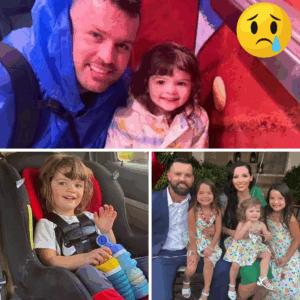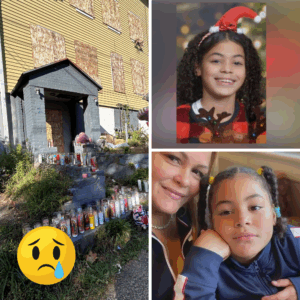In the frost-kissed suburbs of Farmington, Connecticut, where holiday lights twinkle against the encroaching winter dark, a newly released police bodycam video has plunged a community deeper into collective horror. Recorded on December 29, 2024—just three months after investigators believe 11-year-old Jacqueline “Mimi” Torres-Garcia drew her final, starved breath—the footage shows two Farmington officers engaging in casual conversation with her mother, Karla Roselee Garcia, and her boyfriend, Jonatan Nanita. The setting? A cramped condominium on Wellington Drive, where the couple’s toddler daughter babbled innocently in Nanita’s arms. What the officers couldn’t know—what no one outside the family’s shadowed walls knew—was that Mimi’s emaciated remains lay concealed in the basement below, dusted with powder to stifle the mounting stench of decay. As the video rolls, silent and damning, it transforms a routine noise complaint into a chilling tableau of deception, underscoring the razor-thin line between a family’s facade and the unspeakable crimes festering beneath.
The interaction, one of four noise complaints lodged against the Wellington Drive address between September 2024 and February 2025, unfolds with an almost surreal banality. At 9 p.m. on that late-December evening, a neighbor’s 911 call pierced the holiday hush: screams, banging, the unmistakable clamor of a couple fighting. Officers Kyle A. Noddin and his partner arrived promptly, their bodycams capturing the scene in grainy, unflinching detail. Karla Garcia, 29 at the time and visibly pregnant with what would become her fifth child, answers the door with a weary sigh. Her bump, cradled by one hand, stands in stark, unwitting contrast to the life she allegedly helped extinguish months prior. “We’ve been getting these complaints since we moved in,” she explains, her voice laced with exasperation rather than fear. She blames the upstairs neighbors—phantom tormentors in a building rife with thin walls and frayed tempers—insisting the ruckus is mutual. “They’re always at it too,” she adds, a half-smile flickering as if to diffuse the tension.
Nanita, 30 and fresh from a stint behind bars for unrelated offenses, hovers just inside, cradling their one-year-old daughter on his hip. The child, oblivious to the undercurrents, coos softly as the officers step across the threshold for a brief welfare check. The living room, cluttered with toys and takeout containers, exudes the chaos of young parenthood: a high chair in the corner, a Christmas tree half-strung with lights, the faint scent of microwave dinners lingering in the air. When the officers inquire about the household, Nanita responds with disarming candor: “One on the way,” he says, nodding toward Karla’s belly, “and I have a son—he just turned one.” The words hang, incomplete, a deliberate omission that chills in hindsight. No mention of Mimi, the bright-eyed 11-year-old with a love for drawing unicorns and skipping rope. No whisper of her younger sister, either. Just the curated portrait of a couple weathering neighborly spats, on the cusp of a new year.
The officers, seasoned but unsuspecting, chat amiably for less than five minutes. They joke about holiday plans—Nanita quips about dodging family drama—before bidding farewell with a hearty “Happy holidays!” from the couple. As the door clicks shut, the bodycam fades to black, leaving viewers with a gut-wrenching void. Unseen in the frame: the staircase leading to the basement, just steps away, where a 40-gallon plastic tote served as Mimi’s makeshift tomb. According to unsealed arrest warrants, Nanita had crammed her skeletal form inside shortly after her death in September 2024, lining it with a laundry basket and bedsheets before dousing the contents with ammonia and baby powder. The chemical cocktail, meant to mask the odor as decomposition set in, proved only partially effective. By December, the stench had grown insidious enough to force the family into sporadic hotel stays and borrowed couches, yet no one—neighbors, police, or child welfare workers—pierced the veil.
This footage, released by Farmington Police on October 29, 2025, amid a torrent of public outcry, is the sole documented interaction from those four disquieting calls. The others? Ghostly non-events: lights off on one visit, no answer on another, a third dismissed as a false alarm. Each complaint echoed the same refrain—yells piercing the night, thuds like furniture upended in rage—yet yielded no deeper probe. A neighbor, later interviewed by detectives, recounted alerting the Department of Children and Families (DCF) over bruises spotted on Mimi’s younger sibling at a New Britain school. “She showed up marked up more times than I can count,” the woman told investigators, her voice cracking. DCF’s response? A welfare check thwarted by deception: Garcia allegedly orchestrated a video call where the surviving sister, coached to impersonate Mimi, flashed a forced smile from out-of-state. “Homeschooling,” Garcia claimed, having withdrawn the girl from public school on August 26, 2024, under the flimsy pretext of a Farmington relocation. The ruse held, another thread in the web of lies that ensnared an 11-year-old in silence.
Mimi’s descent into oblivion traces a heartbreaking arc through a family fractured long before the basement became a crypt. Born in 2014 to Garcia and Victor Torres, her early years flickered with custody skirmishes and paternal devotion. Torres, a hands-on father who shared joint guardianship reinstated in May 2022, fought tooth and nail for weekends filled with park outings and bedtime stories. But by 2023, Garcia’s life had spiraled into volatility. She linked arms with Nanita, a man whose criminal history—petty thefts, assaults—mirrored the instability of their union. The blended brood, five children in tow including Nanita’s toddler from a prior relationship, crammed into low-rent spaces, their existence a grind of evictions and food stamps. Whispers of neglect rippled outward: school officials flagging fraudulent doctor’s notes for the younger daughter’s injuries, neighbors overhearing Garcia’s barked commands through paper-thin walls.
The warrants, unsealed on October 28, 2025, peel back the horror in forensic detail. Investigators peg Mimi’s death to late summer 2024, triggered by a mundane mother-daughter clash over Garcia’s pregnancy announcement. Upset and acting out, Mimi allegedly shoved her mother during the argument, sending both tumbling down the stairs. Garcia’s initial account to detectives painted Nanita as the villain: enraged, he kicked the child in the head and dragged her limp body away. But confronted with inconsistencies—and the Chief Medical Examiner’s November 7 ruling of homicide by chronic starvation—Garcia’s story crumbled. She confessed to a months-long campaign of isolation: zip-tying Mimi’s wrists and ankles, confining her to a bedroom, rationing meals to crumbs while the household feasted. At death, Mimi tipped the scales at 26 to 27 pounds—less than a kindergartener—her ribs etched like map lines on parchment skin, vital organs withered from want.
Nanita’s role, equally damning, emerged in finger-pointing interrogations post-arrest. Freshly paroled, he claimed ignorance of the tote’s contents when Garcia enlisted him for disposal in early October 2025. “She said it was trash,” he insisted, but cell pings and Facebook logs betrayed frantic searches for “getting rid of stuff” and cemetery hideaways. Instead, he opted for the overgrown lot behind 80 Clark Street in New Britain—an abandoned husk perfect for erasure. There, on October 8, two of his acquaintances, haunted by vague confessions, peered inside and recoiled at the fetal-curled skeleton. Their 911 call cracked the case wide: DNA and dental records confirmed Mimi’s identity by evening, launching a manhunt that snared Garcia and her sister Jackelyn that night, Nanita two days later in a Waterbury parking lot melee captured on yet another bodycam.
Jackelyn Garcia, 28 and previously convicted of risk of injury to a minor, stands accused of complicity—harboring the tote in their shared New Britain apartment until the reek became unbearable. Her tearful admission to detectives? Knowledge of the abuse, silenced by blood ties and fear. The trio, bonds ballooned to $10 million each for Karla and Nanita, $1 million for Jackelyn, awaits November 14 arraignments in Torrington Superior Court, their charges a litany of betrayal: murder with special circumstances, conspiracy, tampering, cruelty, unlawful restraint. Torres, Mimi’s father, shattered and sidelined by thwarted custody bids, now guardians his surviving daughter with hawk-like vigilance. “I begged the system to listen,” he told reporters, his affidavit a raw indictment of DCF’s blind spots—interactions with the family from 2014 to 2021, none after joint custody’s fragile reinstatement.
The bodycam’s release, timed with the petition surge for “Mimi’s Law”—now cresting 14,000 signatures—has supercharged calls for reform. Advocates like Los Fidel demand mandatory in-person homeschool checks, body cams for DCF workers, and ironclad co-parenting rights, decrying Connecticut’s lax oversight of its 5,100 withdrawn students. Lawmakers, from Senator Saud Anwar to Representative Mary Beth Tingling, pledge 2026 bills, but skeptics warn of resource crunches in an agency hemorrhaging staff. Homeschool coalitions push back, noting Mimi’s abuse predated withdrawal, urging precision over panic. Yet, as November 11, 2025, dawns gray and unforgiving, the video’s echo lingers: officers waving goodbye to a pregnant mother and her partner, their “Happy holidays” a requiem for the girl unseen.
In Farmington’s quiet condos and New Britain’s boarded lots—now blooming with teddy bears and “Justice for Mimi” placards—this footage isn’t mere evidence; it’s a mirror to systemic slumber. It humanizes the horror: Karla’s hand on her belly, a symbol of life amid death’s grip; Nanita’s shrug with his daughter, a father’s tenderness twisted into accomplice’s mask. Experts, dissecting the tape frame by frame, highlight the missed cues—the averted eyes, the clipped responses—that hindsight brands as guilt. For Victor Torres, poring over memorials of Mimi’s gap-toothed grins, it’s personal: a daughter’s light snuffed not by strangers, but by the hands that should have held her. As winter tightens its hold, the bodycam rolls on in courtrooms and conscience, demanding awakening. No more basements as vaults, no more powders over putrescence. For Jacqueline “Mimi” Torres-Garcia, whose laughter once danced through courtyards, may this revelation forge safeguards unbreakable—a legacy born from the ashes of one little girl’s unimaginable end.





